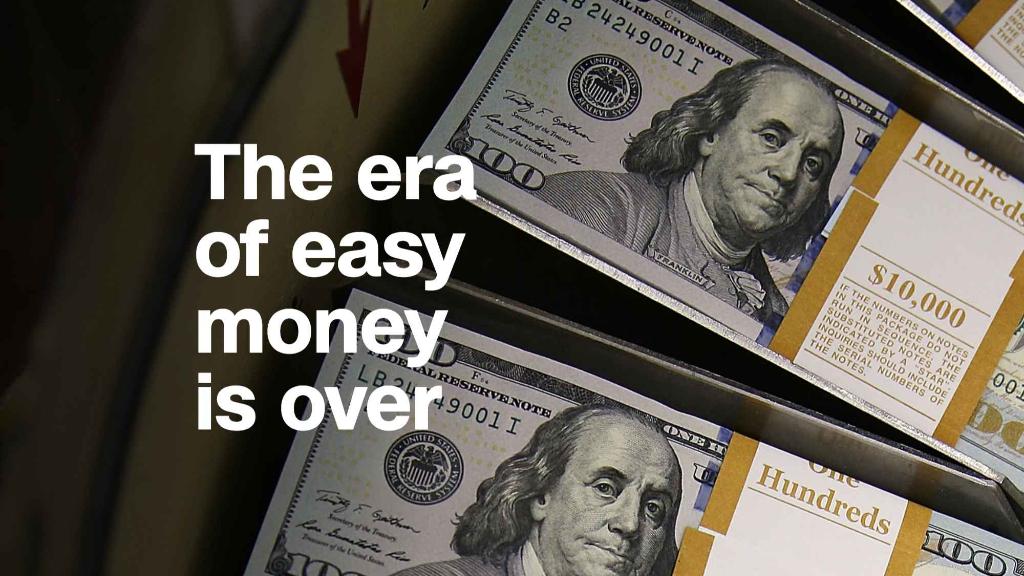
The good news is that the stock market party may not be over. The bad news is that it might be time for last call.
Morgan Stanley predicts in a report this week that stocks "can mount one last rally" this summer before hitting a peak during the second half of the year.
"We think that this bull market has limited runway," Andrew Sheets, head of cross asset strategy at the investment bank, wrote to clients.
Morgan Stanley cited a series of positives that are morphing into negatives. World economic growth is predicted to slow. Inflation is finally picking up. Washington has changed its focus from tax cuts to tariffs. And the Federal Reserve looks set to speed up interest rate hikes.
"All this now appears to be changing, and all at once," Sheets wrote, adding that it's "not just a harder environment, but a fundamental shift."
The bull market began in March 2009 and is now the second-longest on record. The S&P 500 has more than quadrupled since bottoming at 666 during the Great Recession.
Related: Get ready for higher gas prices, mortgage rates
The stock market only seemed to go up between late 2016 and the beginning of this year. The Dow climbed from 18,333 when President Trump was elected to a record high of 26,616 in late January.
But fears about inflation and trade wars sent stocks spiraling lower this winter. The Dow is still about 2,000 points below its all-time high.
The biggest question on Wall Street is whether the bull market is finally running out of steam.
Morgan Stanley argues the market is already "in the midst of a topping process," in which the market for corporate borrowing peaks first, followed by bond yields and then stocks.
Sheets said that corporate credit markets probably hit a top in late January — and history shows the stock market tends to do the same nine to 12 months later. He said that points to a stock market peak in the third or fourth quarter.
"2018 will see a series of rolling tops," Sheets wrote, adding that the extreme turbulence at the beginning of 2018 was "not an aberration."
It's not just Morgan Stanley adopting a more cautious attitude about stocks. About 60% of fund managers polled by Bank of America Merrill Lynch in early May said they believe stocks either peaked in January or will do so later this year.
Investors are also growing more concerned that the economic expansion, already tied for the second longest on record, will falter before long.
Although just 2% of fund managers polled by Bank of America think a recession is coming this year, 84% see a downturn by the end of 2020. The consensus pick for the start of a recession? The first quarter of 2020.
"Some time in the next year and a half, the economy will probably fade" into a recession, said Guy LeBas, chief fixed income strategist at Janney Capital. "It's part of the natural ebb and flow of the US economy."
Related: 10-year Treasury yield spikes, spooking the market
Of course, this is not the first time that someone has predicted the demise of the economic recovery and the bull market. And those previous calls turned out to be wrong.
This cycle has proven to be extremely resilient, surviving the European debt crisis, the unprecedented downgrade of America's credit rating and a crash in oil prices.
And there are good reasons for stocks to keep rallying, including blockbuster corporate profits, Trump's corporate tax cuts and a healthy global economy. Interest rates are going up, but they remain historically low.
Timing the market is notoriously difficult, if not downright dangerous. Very few investors are able to jump in precisely at the right moment — and then get out before the storm comes.
Morgan Stanley acknowledges that "timing matters" and the actual sequence of market peaks may differ because no two cycles are exactly alike.
"Our forecasts are consistent with the usual late-cycle pattern, where topping is a process, not a point in time," Sheets wrote.
The good news is that Morgan Stanley doesn't anticipate a repeat of the carnage that the stock market suffered when the dot-com bubble burst or the financial crisis struck. Sheets explained that those market crashes were caused by the biggest stock market and credit bubbles in modern history.
"Today's excesses aren't nearly as extreme," Sheets wrote.


